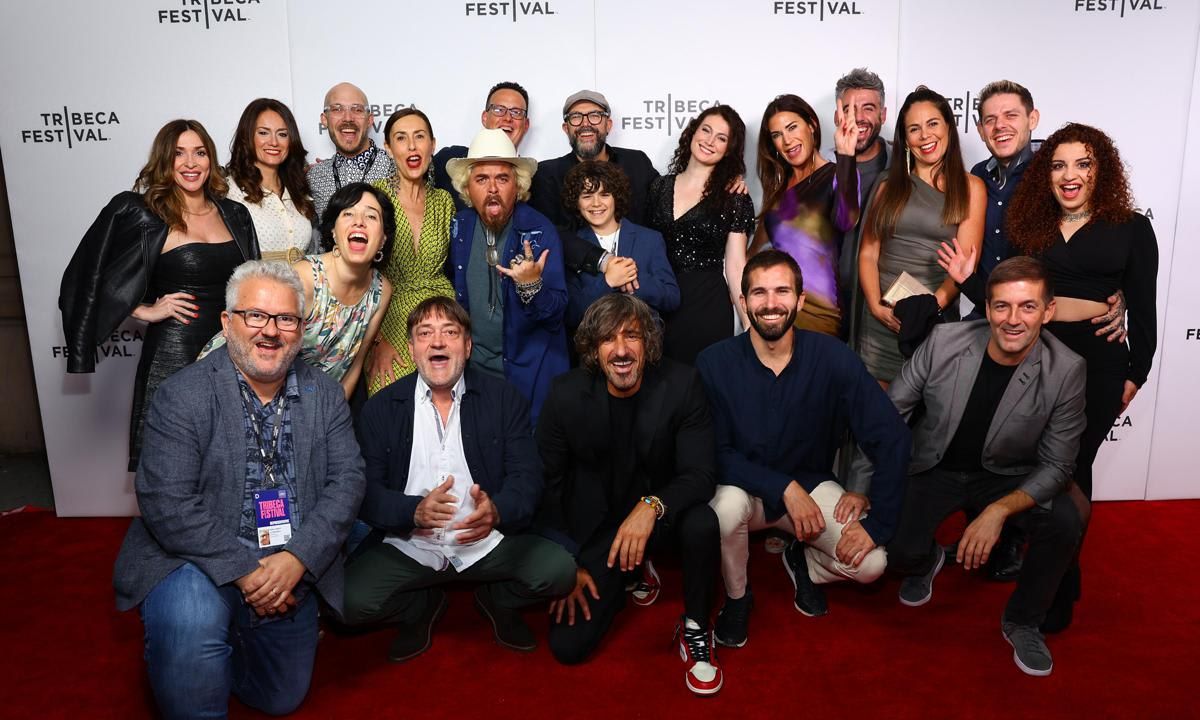Hugo Ruiz can’t believe he’s in Tribeca. The Spanish director of “One Night with Adela” was abuzz with excitement, taking in his New York surroundings with the expression of someone whose dreams are coming true and hasn’t gotten around to believing it. I met up with Ruiz at a coffee shop in the Tribeca area, on the day of the start of the festival. “I feel like I’m hallucinating,” said Ruiz in Spanish.
The excitement in the area was palpable, even though there was an apocalyptic edge to the day, which had a tint of yellow due to the toxic plume of air that seeped in from Canadian wildfires. Still, the people around us were discussing films and festival events, carrying out all manner of conversations. The world may be ending but work never stops.
“One Night with Adela” is Ruiz’s debut film. It’s also the only film in the festival that’s entirely in Spanish. “Tribeca has always been one of the biggest festivals in my mind,” he said. “I didn’t know that Spanish-speaking cinema has very little presence on this stage.” Ruiz’s film was entered in the Midnight selection, leaving it out of award eligibility. Still, Ruiz was nominated, and later on won, the award for best new narrative director. It’s a feat that upon our conversation, I don’t think he would have believed. “I’m so happy, and I’ve had a great team who’ve managed to roll with my crazy ideas,” he said.
Starring a stunning Laura Galán, “One Night with Adela” follows the titular character, a waste collector, on a quest for vengeance. Shot in one apparent continuous shot, the film has a relentless pace, with Galán occupying the frame at all times with an angry facade. Her work is towering and is matched by cinematographer Diego Trenas, who seamlessly trails after her with the camera and doesn’t miss an inch of her grimaces and angry power walks.
“The origins of this film come from a German film called ‘Victoria,” said Ruiz. “Victoria” is also a continous shot film that follows the title character over the course of an evening. Another principal part of Ruiz’s film comes frome one of his childhood fixations. “I don’t know why, ever since I was a kid I’ve had an obsession with waste collectors and what they do at night,” said Ruiz with a laugh. “They’re always in their trucks and who knows what they find, you know?” Echoes of our conversations are clear in the script, which Ruiz wrote, and has a moment where Adela pawns off a Polaroid camera that she finds in the garbage, taking some photos that will play a part later on in the story.
“I wanted the spectator to be with her at all times,” said Ruiz. This pays off in dividends in the film’s climax, a sequence of events that prompted gasps from my screening. “Adela is a woman that’s never had control of her life. In the film, I wanted her to have control from the moment it starts until it ends.”
Adela is put through the wringer, acting violently and unexpectedly over the course of the film’s runtime. Galán’s performance is one of the main reasons why the film works, something that Ruiz calls a great source of relief. He shared a story from set. After the film was shot and Galán had lugged around heavy bags, driven garbage trucks, danced half naked, and done all manner of physically demanding activites, the assistant director approached Ruiz and revealed that she was five months pregnant. “I feel like if I had known that, I would’ve changed the way we shot the film and the way we approached her character and some of her scenes,” said Ruiz.
Ruiz praises her commitment and chamaleonic ability to do things that are out of anyone’s comfort zones. Large parts of the film are made up of Adela driving through the city, inside her big garbage truck, getting in and out of it and providing plenty of opportunities for Trenas and Ruiz to show off some camera magic. Ruiz rented a garbage truck for a week, wanting Galán to feel comfortable for these scenes. She learned to drive it within the hour. “She looked like a truck driver, someone who’s been driving large vehicles her entire life,” said Ruiz.
Near the end of our talk, I asked Ruiz what was the ideal reaction he wanted from audience members. “What I want and what I think we achieved is a reaction other than indifference. I think it’s a film that people will talk about once they exit the theater.”
“One Night with Adela” is screening in Tribeca Festival.
,type=downsize)
